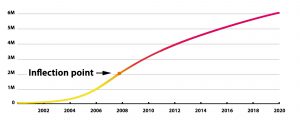How do Wikipedia and Wenard help each other?
On one hand, Wikipedia has been a major success story. The largest section of Wikipedia is the English section, which has recently reached the benchmark of six million articles (or pages). This is a wonderful achievement, particularly for a 100%-volunteer effort. Wikipedia certainly trumps all other encyclopedias or similar knowledgebases. For example, Britannica’s online version is meager in comparison: it has only 120 thousand articles, and as of 2020, the average length of a Britannica article is only 63% of a Wikipedia article. The latest Britannica published on paper was much smaller still.
On the other hand, as learning on all levels (from elementary schooling to all the way up scientific research and professional journalism) has shifted online, Wikipedia now occupies a unique role in human cognition: it serves as the universal entry point and the structural baseline for all knowledge. Virtually no new content is produced without consulting Wikipedia at least once. Such an extraordinary humanitarian and social role demands extraordinary accountability. Wikipedia must reflect completeness and lack of bias.
In this larger context, six million Wikipedia pages is decisively insufficient. Wikipedia volunteers have been superb and industrious, but they largely work from underlying sources that are already available online. This factor alone naturally creates a whole spectrum of biases. Wikipedia is predisposed towards modern notable events, organizations, people, etc., rather than historical. It favors entities of developed countries versus those of developing countries, and technical versus social topics.
The resulting gaps are staggering. For example, in the Western world, over 90% of populated places have their own page, while in Africa, it’s less than 5%. Even in United States and Western Europe, less than 1% of notable historical (according to Wikipedia’s own notability criteria) people and organizations have articles, and this number plunges by orders of magnitude for the developing world.
Alternatively, we may look at this lack of completeness from a different angle: every officially published and reviewed book can have a Wikipedia page, and many books have such pages (e.g. War and Peace, Coming of Age in Samoa, and Diary of a Wimpy Kid). However, there are 120 million published books in the world, and most of them have been reviewed. It follows that if all historically important books had Wikipedia articles, there would be many more than six million Wikipedia pages dedicated to books alone.
Compared to all possible content, six million is a small number. Unfortunately, it doesn’t look like Wikipedia’s current model can close the gap soon (or ever). Despite the egregious omissions, fewer new pages are added to Wikipedia each year. It seems that a few years ago, the Wikipedia model started to exhaust itself. It experienced an inflexion point, transitioning from exponential to merely logarithmic growth.
This is where fresh reinforcements—such as the Wenard Institute—can help. Wenard’s content creation model is organized differently than Wikipedia’s. It complements the Wikipedia writing  process and serves the missions of both Wenard and Wikipedia well. Wenard seeks to add articles to areas of Wikipedia where there are noticeable information gaps.
process and serves the missions of both Wenard and Wikipedia well. Wenard seeks to add articles to areas of Wikipedia where there are noticeable information gaps.
Of course, at Wenard, we are sensitive to the norms, culture, and concerns of the Wikipedia community. We are willing to walk extra mile to make sure that all our contributions are valued, trusted, and interwoven into the fabric of Wikipedia’s ever-improving content. Here are some important principles that we follow to ascertain this.
- Transparency. The Wenard Institute uses both paid staff and volunteers to produce content, but all people associated with Wenard clearly identify this fact to Wikipedia community. Furthermore, the Wenard Institute focuses solely on content creation. It never compels, encourages, suggests, facilitates, or prohibits its members’ participation in any Wikipedia community policy, procedural discussions, or “votes.”
- Compliance. All Wenard staff that contributes to Wikipedia are trained in Wikipedia policies and guided to follow them. Over the two decades of Wikipedia’s existence, its community has created an impressive legislative body. That is supplemented by an even more noteworthy corpus of judicial (“arbitration”) decisions that establish various interpretation precedents of policies and their applications. This complexity, coupled with inherently irregular enforcement (all Wikipedia administrators are volunteers), creates a difficult environment to navigate without extensive training.
- Higher editorial standards. The quality of existing Wikipedia articles fluctuate gravely. Some articles (especially those created in early years, before the adoption of the higher editorial standards) lack minimally viable breadth, verifiability (the requirement to clearly identify the sources of the stated facts and opinions), and/or proper formatting and visual aids. The Wenard Institute creates Wikipedia pages to the highest editorial standards. We follow the Manual of Style and Harvard citation system, making clear and specific attributions to all information. In addition, every effort is made to supplement text with appropriate visual aids, preferably under Wikimedia Commons free licensing.
- Focus on information gaps. As stated in its mission, the Wenard Institute aims to narrow existing gaps in freely available information. Therefore, we focus on adding Wikipedia pages to areas where Wikipedia is missing information. This avoids contentious areas, because in such areas, multiple editors are already contributing.
- Non-profit goals. The Wenard Institute is a publicly-supported non-profit organization as described in section 501(c)(3) of the Internal Revenue Code. Just like Wikipedia, Wenard dedicates its resources to the creation of new content to be freely distributed worldwide.





